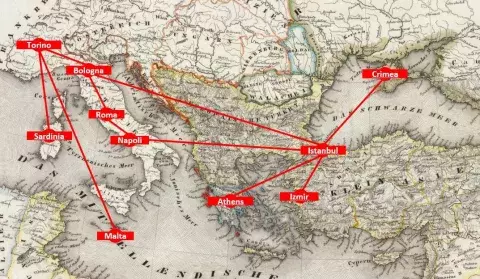
Nell’ambito della CSACTI Lecture Series, ciclo di conferenze del Centro Studi su Asia Centrale, Caucaso, Turchia, Tibet e Iran, martedì 19 marzo si tiene la conferenza della dott.ssa Berna Kamay-Ulusay (Sabancı University, Istanbul)
This research sheds light on the joint efforts of the Ottoman Empire and the emerging Italian nation as they worked together to combat a sprawling criminal organization that emerged during the Crimean War (1853-56) and extended from Istanbul to Turin and beyond the Mediterranean. These efforts required legislative actions and harsh penalties that fundamentally altered the dynamic of diplomacy between two powers whose relations were for long rooted in the treaty system. Against the backdrop of political turmoil due to the Crimean War and Risorgimento, a group of war time profiteers, including soldiers, artisans and career-lawyers, used the opportunity to engage in forgery. Forgery was a severe offense considered anarchist activity and the states called for joint actions to address it everywhere in the world in the nineteenth century. In this vein, this historical episode shows how the international politics of the time not limited to military alliances but evolved through diverse diplomatic dialogues and legal mediations to control an international security crisis. The diplomatic networks Ottoman officials established across the Mediterranean route and seaports and the informal agencies they communicated with, resulted in an elaborate information channel extending beyond imperial borders. As such, it was a world of skillful diplomats and state officials with expertise in law who shaped the international politics. However, it was also a world of professional impostors and criminal fugitives whose transnational mobility redefined the security politics with equal force, which underscored the crucial questions of international law: nationality and the asylum rights.
Per ascoltare in streaming l'evento: https://shorturl.at/jyHXZ.
per info: lnocera@unior.it.




